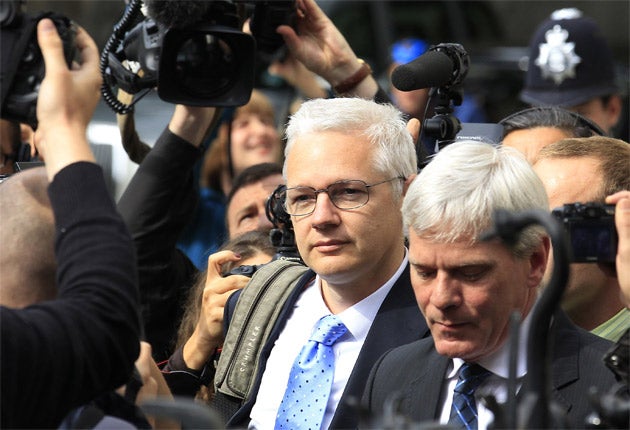Your support helps us to tell the story
From reproductive rights to climate change to Big Tech, The Independent is on the ground when the story is developing. Whether it's investigating the financials of Elon Musk's pro-Trump PAC or producing our latest documentary, 'The A Word', which shines a light on the American women fighting for reproductive rights, we know how important it is to parse out the facts from the messaging.
At such a critical moment in US history, we need reporters on the ground. Your donation allows us to keep sending journalists to speak to both sides of the story.
The Independent is trusted by Americans across the entire political spectrum. And unlike many other quality news outlets, we choose not to lock Americans out of our reporting and analysis with paywalls. We believe quality journalism should be available to everyone, paid for by those who can afford it.
Your support makes all the difference.Julian Assange's sexual behaviour was "disrespectful, discourteous and pushing the boundaries" – but not rape, the WikiLeaks founder's legal team insists, in a change of strategy they hope will save him from extradition to Sweden.
Mr Assange and his new lawyers arrived at the Royal Courts of Justice in London to appeal against the decision to extradite him to Sweden, where he is alleged to have raped one woman and molested another.
Ben Emmerson QC, acting for Mr Assange, did not paint his client in a favourable light as he described how Mr Assange's sexual encounters with the two women had been consensual.
In previous hearings Mr Assange's legal teams have focused on concerns that if their client is extradited to Sweden, he may then be extradited to the US and face charges over his release of confidential documents, which he claims could see him face the death penalty.
Mr Emmerson told Lord Justice Thomas and Mr Justice Ousely that he was not challenging the fact that the two women "found Mr Assange's sexual behaviour in these encounters disreputable, discourteous, disturbing or even pushing towards the boundaries of what they were comfortable with".
But the sexual activities that occurred had taken place with consent and, unlike in Sweden, could not be criminalised in the English jurisdiction, argued Mr Emmerson.
On 13 August last year, Mr Assange was a guest at the Stockholm studio apartment of the first lady, known as AA, where the two had sex. Mr Emmerson told the court how AA had initially welcomed Mr Assange's sexual advances after they had been out for dinner one evening, but was concerned he did not want to wear a condom.
Eventually Mr Assange consented to wear one, but it broke, which AA maintains Mr Assange did on purpose, though this is not supported by forensic analysis.
Even were he to have done so, which Mr Assange maintains he did not, Mr Emmerson argued it would not constitute a crime under English law.
"Even if it had been a complete and deliberate deception," Mr Emmerson said, "It would not be a crime in this jurisdiction."
In the second case, Mr Assange was a guest in the apartment, and bed, of a second woman, known as SW. SW says she was awoken by Mr Assange having sex with her, without a condom, a situation she had sought to prevent before the pair had fallen asleep some hours previously.
She asked Mr Assange if he was wearing protection, he replied that he wasn't, yet the two continued. "She may not have enjoyed the experience, but she clearly consented to it," Mr Emmerson said.
Mr Assange has always maintained that the charges against him are politically motivated, and are a consequence of his having leaked thousands of confidential US diplomatic documents, through the WikiLeaks site.
Today the court will hear from barristers acting for the Swedish Prosecution Authority, after which the judges will consider their verdict.

Join our commenting forum
Join thought-provoking conversations, follow other Independent readers and see their replies
Comments